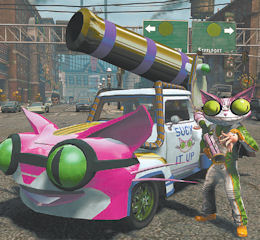Agoura Hills-based video game publisher THQ Inc. is struggling with poor sales and a stock price below $1 a share, problems that have forced the company to cut jobs. But the company’s much larger competition isn’t doing much better. Even with certain titles selling millions of copies in recent months, including “Saints Row: The Third from THQ,” the video game industry continues to have its challenges. Sales and rentals of console and digital games in 2011 were down 2 percent when compared to 2010, according to market research firm NPD Group. The firm’s preliminary figures put sales between $16.3 billion and $16.6 billion for 2011. Changes in consumer habits have THQ and the other big game makers Electronic Arts Inc. and Activision Blizzard Inc. consolidating operations to focus on their core games and expanding into digital content, creating uncertainty for investors. THQ CEO Brian Farrell said while there is little that the game publishers can do to change that uncertainty, they are trying to show that those challengesare being considered in a “rational” way. “That single-minded focus is how we intend to win going forward,” Farrell said. Consolidating operations, however, means staffing cuts. And THQ, EA and Activision Blizzard all have scaled back their workforce. Shaken by the disappointing sales of its uDraw Game Tablet, THQ laid off 30 employees at its Agoura Hills headquarters in December. In August, the company closed two studios in Australia and dissolved a development team at the company’s Phoenix location, resulting 200 job cuts. In February, EA reduced its staff at a Vancouver game design studio by an unspecified number. And the Blizzard subsidiary of Activision Blizzard announced Feb. 29 it would cut 600 positions although most would not be in game development or related its most popular game, “World of Warcraft”. At THQ, the strategy was to make its reductions a one-time only event, Farrell said; although, in the overseas studios the layoffs will be done over time to meet local regulations, he said. “There are no further cuts planned at this time,” Farrell said. Cutting costs is looked at as a way to improve THQ’s bottom line, which has struggled of late with each quarterly earnings report. For the third quarter ending Dec. 31, THQ reported a net loss of $55.9 million, or 82 cents per diluted share on revenues of $305.5 million. For the same period in 2010, the company had a net loss of $15 million, or 22 cents per diluted share, on revenues of $314.6 million. In the same period, EA reported a net loss of $205 million, or $0.62 per diluted share, on revenues of $1 billion. For the third quarter in 2010, the company reported a net loss of $322 million, or $0.97 per diluted share, on revenues of $1.1 billion. Activision Blizzard fared the best of the three, reporting net income of $99 million, or $0.08 per diluted share, on revenues of $1.4 billion for the quarter ending Dec. 31. For the same period in 2010, the company reported a net loss of $233 million, or $0.20 per diluted share, on revenues of $1.1 billion. “EA and Activision are five times THQ’s size, so THQ doesn’t compete particularly well,” said Michael Pachter, managing director of equity research for Wedbush Securities in Los Angeles. “Its (THQ’s) restructuring is a function of its overreliance on licensed content at a time when demand for much of that content was waning. They are cutting back on marginal projects because they have to, as their profitable games don’t throw off enough to allow them to carry the losers.” Pachter said THQ has “only really excelled at licensed content” and is not as good as the others at original content. “They have had some poor judgment about game selection, and have more misses than hits,” he said. “That is why they are in this position.” One of the misses was with uDraw, a big seller in the 2010 holiday season that could not replicate that success a year later. It was a “problematic” decision to have made uDraw a significant part of the revenue outlook for the third quarter when it was not central to the core offerings, Farrell said. “We were justifiably punished,” he said.
